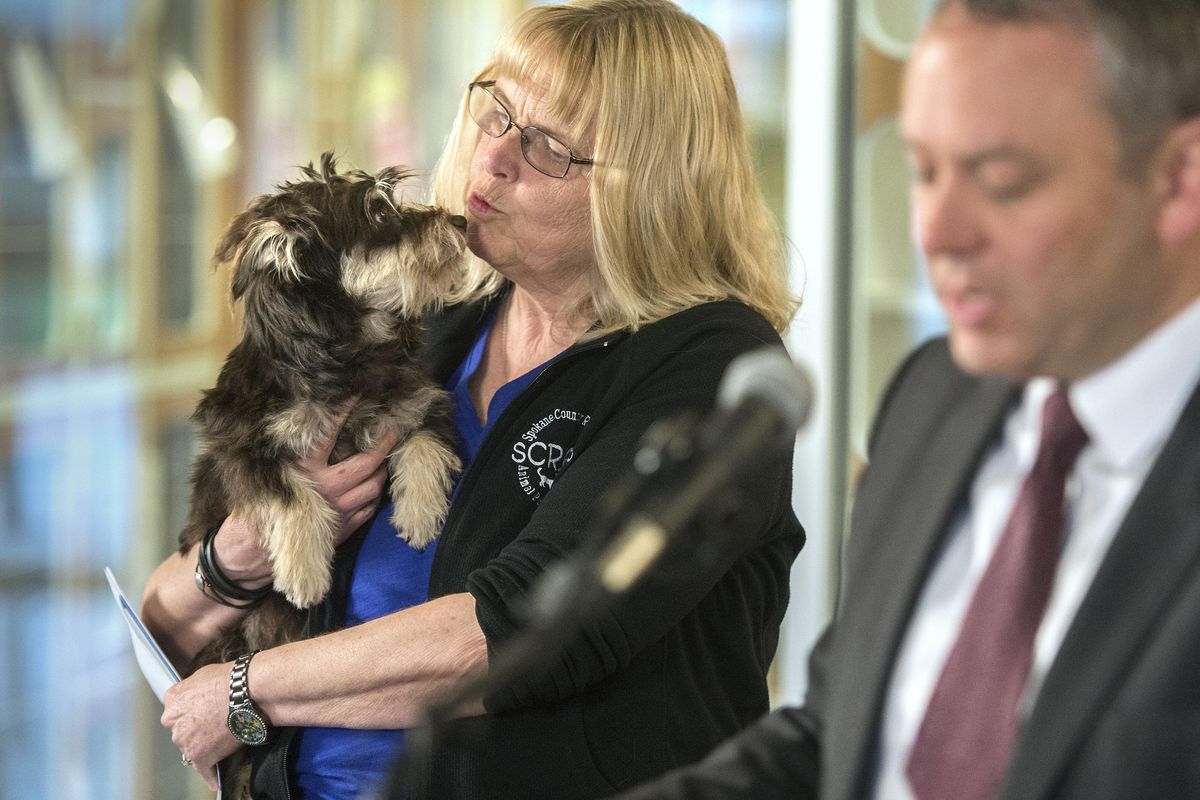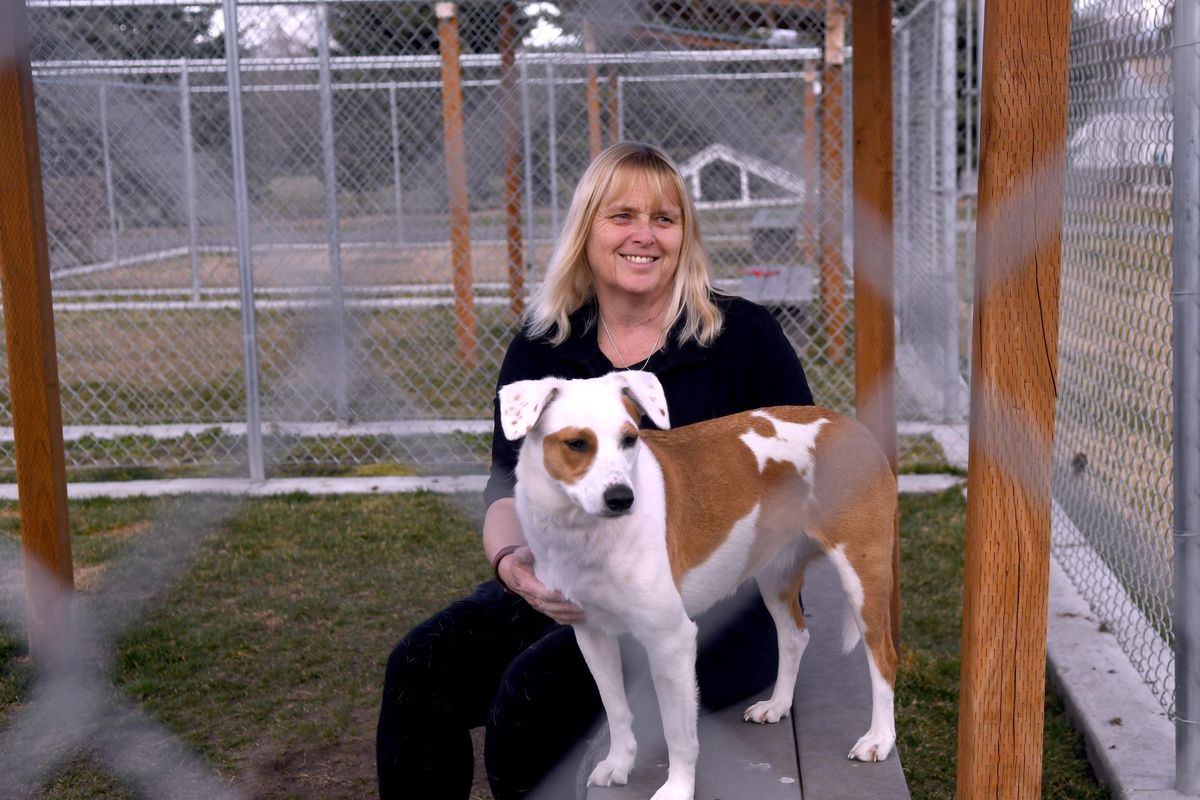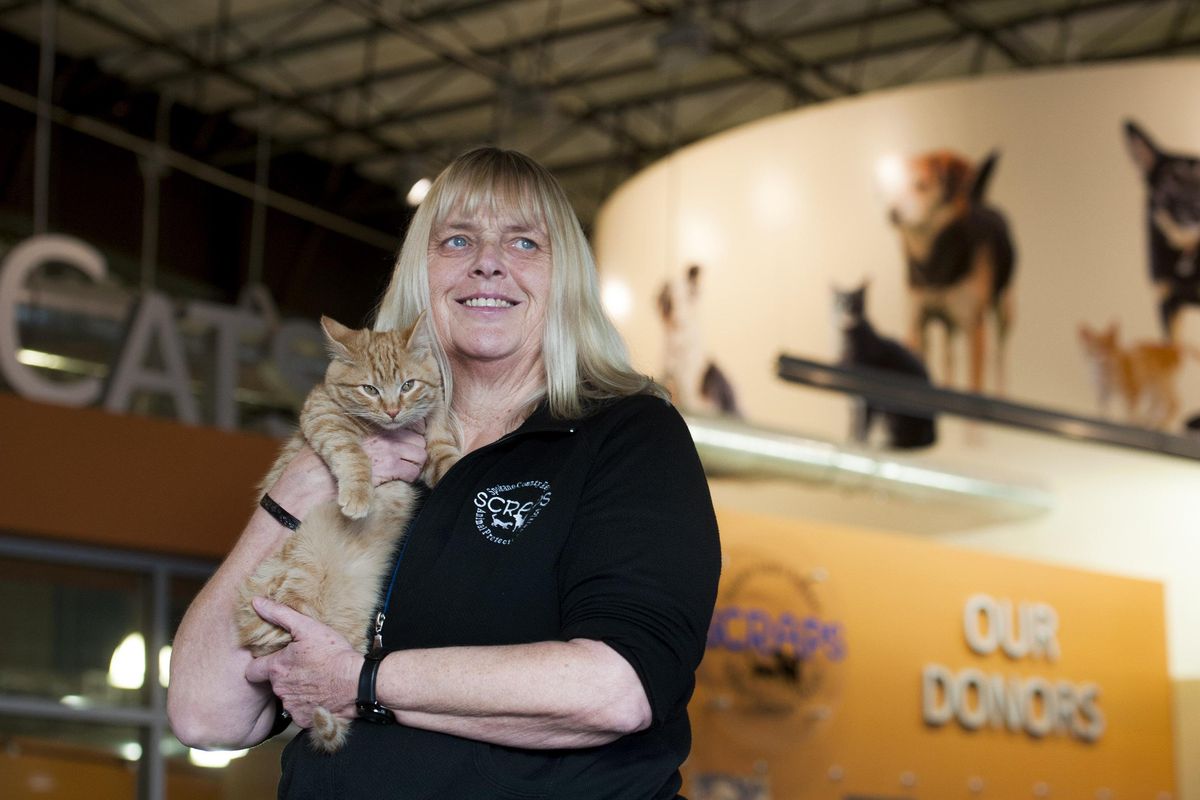SCRAPS regional director Nancy Hill to retire
SCRAPS regional director Nancy Hill holds a cat at the agency’s office in Spokane Valley on Jan 23, 2018. (Kathy Plonka / The Spokesman-Review)Buy a print of this photo
During Nancy Hill’s career as an animal control officer and regional director of Spokane County Regional Animal Protection Service, she has reunited pets with their owners, rescued a dog on a cliff at Riverside State Park, investigated animal cruelty cases and established Spokane County’s regional animal protection program.
After 32 years at the agency known as SCRAPS, Hill announced her retirement effective March 22.
Hill has had a lifelong love of animals but didn’t have a dog or cat growing up, she said.
“I had a parakeet, but befriended all the dogs and cats in the neighborhood,” she said. “When I was a senior in high school, I volunteered at the ASPCA” – the American Society for the Prevention of Cruelty to Animals – “and that was my first kind of experience with an animal shelter.”
Hill attended the University of Arkansas and received a degree in environmental science. After graduation, she moved to North Idaho and was employed with the U.S. Forest Service as a hydrologic technician for several years. She later moved to northern Utah, where she was employed by the state parks department and as a zookeeper for five years before moving to Connecticut, where she managed a sanctuary for more than 400 cats.
In 1985, Hill moved to Spokane.
“I saw a newspaper ad for what was then called an animal control officer,” she said. “I applied and went through the interview process.”
Hill was selected for the position out of a pool of 150 applicants.
Hill started with SCRAPS in 1986 as an animal control officer, helping reunite lost pets with their owners and handling nuisance animal calls. She was one of four officers staffed on emergency on-call shifts. She held that position for 10 years.
Some of Hill’s noteworthy adventures as an animal control officer included seizing a Bengal tiger and a lynx, removing a 6-foot python from a vehicle during a DUI arrest and rescuing a dog on a cliff in Riverside State Park.
“When the dog was rescued, it collapsed in my lap,” she said. “It was rail thin and dehydrated. We fondly named it Cliff. This nice couple adopted it and took it to Montana with them.”
Hill was promoted to SCRAPS regional director in 1995. At first, she was apprehensive about the new position because she loved working in the field, she said. Still, she adjusted quickly to her new post.
During 2008, Hill and SCRAPS assisted in getting the first felony dog fighting conviction in the state of Washington.
“After the conviction, the city of Seattle called and wanted to know how we got a conviction,” she said. “We have a great team of investigators and it was just a good feeling to stop dog fighting, which I never thought we’d see in our community.”
Hill’s standout accomplishment was establishing the county’s regional animal protection program.
“It was a big career goal for me and a long time coming,” she said. “It is nice to see the community enjoy the animal shelter. I’ve had a lot of moments that really made me feel like we’ve made a difference.”
Hill’s efforts to create for a regional animal protection program began around 2010, when she laid the groundwork for a regional animal control task force. That prompted discussions between community leaders and elected officials about such a program.
Former Spokane County Commissioner Todd Mielke said the county was at a point where it needed to upgrade or find a new animal shelter, which was aging and inefficient. At the same time, SpokAnimal wanted to focus primarily on adoptions and get out of the animal shelter position it was in.
“We also found people were complaining when their pets got lost. They had no idea where to start the search,” Mielke said. “There was really no centralized organization to handle that.”
Former Spokane City Councilman Steve Salvatori was a council liaison during discussions of a regional animal protection program and remembers the vote to establish it was unanimous.
Spokane County, the city of Spokane and Spokane Valley were all supportive of the concept and willing to give up a little to get a better outcome, he said.
“Nancy put my mind at ease with her professionalism. She made sure we understood all the nuances with going to a regional system,” Salvatori said. “What always most impressed me about her is she was an extremely hard worker for the animal system. She cared about animals and her heart was always in it.”
SCRAPS purchased a former Harley Davidson building on Trent Avenue in 2013 and the regional program was established in January 2014. SCRAPS moved into the 30,000-square foot building the following June where it now provides shelter for lost and abandoned animals, licensing services and community classes.
“Nancy had a vision of a regional approach for not only the animal control side, but the facility side,” said Mielke. “Her legacy is a regional approach to animal control and probably one the finest facilities in the United States. We now have a one-stop shop. If someone is looking for a lost pet, they start at SCRAPS and go from there.”
Hill said a challenge during her career was encountering the misconceptions from people who didn’t understand that animal control officers want to save animals and help people. SCRAPS saves more than 93 percent of the dogs that come to the facility.
“It’s hard when I take such pride in what I do here and what our team does here,” she said. “And for people to not understand that, it’s probably been the most difficult thing over the years.”
SCRAPS has more than 600 volunteers, thousands of donors and many local and state rescue partners. Under Hill’s leadership, the SCRAPS facility recently constructed an in-house veterinary clinic.
SCRAPS’ goal is public safety, but also to protect animals. It’s the kind of job that never ends, with calls 24 hours a day, Hill said.
“But a good thing is you have the ability to help a person or animal every day at every level here,” she said. “What I’ll miss the most is the people because it is such a great team.”
Hill’s retirement plans include traveling, spending time with her family, friends and rescue dog Zoey.
Eventually, she would like to do some volunteer work.
“In the fall, or as winter approaches, I will look for some volunteer opportunities,” she said. “I do want to give back to the community.”


